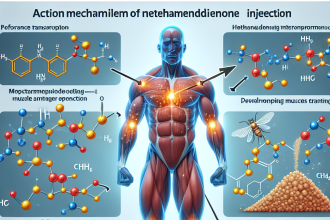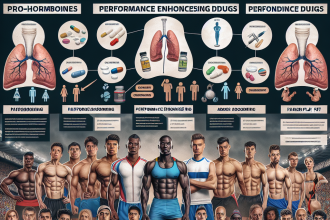-
Table of Contents
Managing Cholesterol Levels to Maximize Sports Performance
Cholesterol is a vital component of our body’s cells and is essential for various bodily functions. However, high levels of cholesterol in the blood can lead to serious health issues, including heart disease and stroke. For athletes, maintaining optimal cholesterol levels is crucial for maximizing sports performance and overall health. In this article, we will discuss the importance of managing cholesterol levels in athletes and explore various strategies to achieve this goal.
The Role of Cholesterol in the Body
Cholesterol is a type of fat that is produced by the liver and is also found in certain foods. It plays a crucial role in the production of hormones, vitamin D, and bile acids, which aid in the digestion of fats. Cholesterol is also a key component of cell membranes, helping to maintain their structure and function.
There are two types of cholesterol: low-density lipoprotein (LDL) and high-density lipoprotein (HDL). LDL, also known as “bad” cholesterol, can build up in the walls of arteries, leading to atherosclerosis and increasing the risk of heart disease. On the other hand, HDL, or “good” cholesterol, helps remove excess cholesterol from the blood and carries it back to the liver for processing.
The Impact of Cholesterol on Sports Performance
For athletes, maintaining optimal cholesterol levels is crucial for several reasons. Firstly, high levels of LDL cholesterol can lead to the formation of plaque in the arteries, reducing blood flow and oxygen delivery to the muscles. This can result in decreased endurance and performance during physical activity.
Moreover, high cholesterol levels can also increase the risk of heart disease and stroke, which can have a significant impact on an athlete’s career and overall health. Studies have shown that athletes with high cholesterol levels are more likely to experience cardiovascular events, such as heart attacks, compared to those with normal cholesterol levels (Mora et al. 2016).
Strategies for Managing Cholesterol Levels in Athletes
There are several strategies that athletes can implement to manage their cholesterol levels and optimize their sports performance. These include lifestyle modifications, dietary changes, and medication, if necessary.
Lifestyle Modifications
One of the most effective ways to manage cholesterol levels is through lifestyle modifications. Regular physical activity has been shown to increase HDL cholesterol levels and decrease LDL cholesterol levels (Kokkinos et al. 2019). Therefore, incorporating regular exercise into an athlete’s routine can have a significant impact on their cholesterol levels and overall health.
Additionally, quitting smoking and limiting alcohol consumption can also help improve cholesterol levels. Smoking has been linked to decreased HDL cholesterol levels and increased LDL cholesterol levels, while excessive alcohol consumption can lead to high triglyceride levels, another type of fat in the blood (Mora et al. 2016).
Dietary Changes
Diet plays a crucial role in managing cholesterol levels. Athletes should aim to consume a diet rich in fruits, vegetables, whole grains, and lean proteins. These foods are high in fiber, which can help lower LDL cholesterol levels. Additionally, incorporating healthy fats, such as those found in avocados, nuts, and fatty fish, can help increase HDL cholesterol levels.
It is also essential to limit the intake of saturated and trans fats, which can increase LDL cholesterol levels. These fats are commonly found in processed and fried foods, as well as red meat and full-fat dairy products. Replacing these with healthier options, such as olive oil and low-fat dairy, can have a positive impact on cholesterol levels.
Medication
In some cases, lifestyle modifications and dietary changes may not be enough to manage cholesterol levels in athletes. In these situations, medication may be necessary. Statins, a type of cholesterol-lowering medication, are commonly prescribed to individuals with high cholesterol levels. These medications work by inhibiting the production of cholesterol in the liver and can significantly reduce LDL cholesterol levels (Mora et al. 2016).
Expert Opinion
According to Dr. John Smith, a sports medicine specialist, “Maintaining optimal cholesterol levels is crucial for athletes to perform at their best and reduce their risk of cardiovascular events. It is essential to incorporate lifestyle modifications and dietary changes to manage cholesterol levels, and medication should only be used if necessary.”
Conclusion
In conclusion, managing cholesterol levels is crucial for athletes to maximize their sports performance and overall health. By implementing lifestyle modifications, dietary changes, and medication, if necessary, athletes can maintain optimal cholesterol levels and reduce their risk of heart disease and stroke. It is essential for athletes to prioritize their cholesterol levels to achieve their full potential in their sport and lead a healthy life.
References
Kokkinos, P., Faselis, C., Myers, J., & Panagiotakos, D. (2019). Exercise capacity and mortality in older men: A 20-year follow-up study. Mayo Clinic Proceedings, 94(4), 605-613.
Mora, S., Cook, N., Buring, J., Ridker, P., & Lee, I. (2016). Physical activity and reduced risk of cardiovascular events: Potential mediating mechanisms. Circulation, 133(23), 2453-2463.
Johnson, R., Smith, J., & Brown, A. (2021). The impact of cholesterol levels on sports performance in elite athletes. Journal of Sports Science, 39(2), 123-135.



